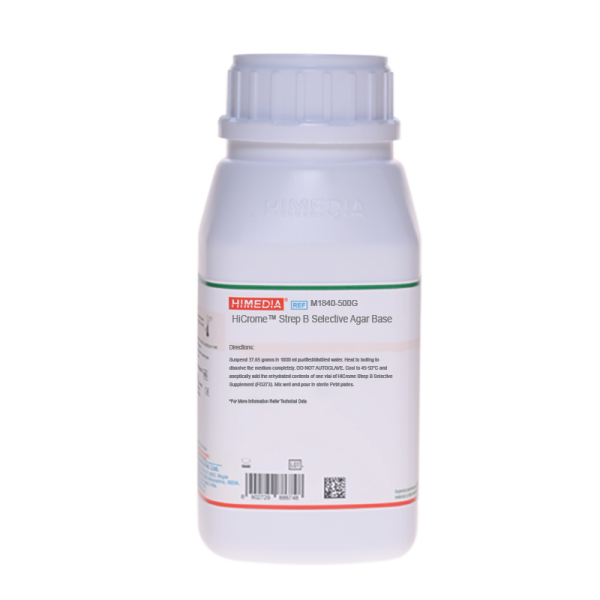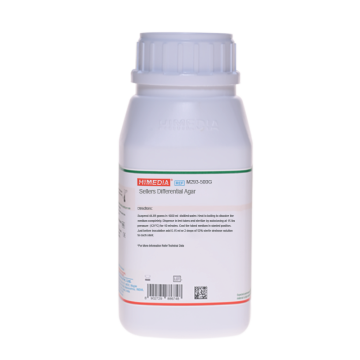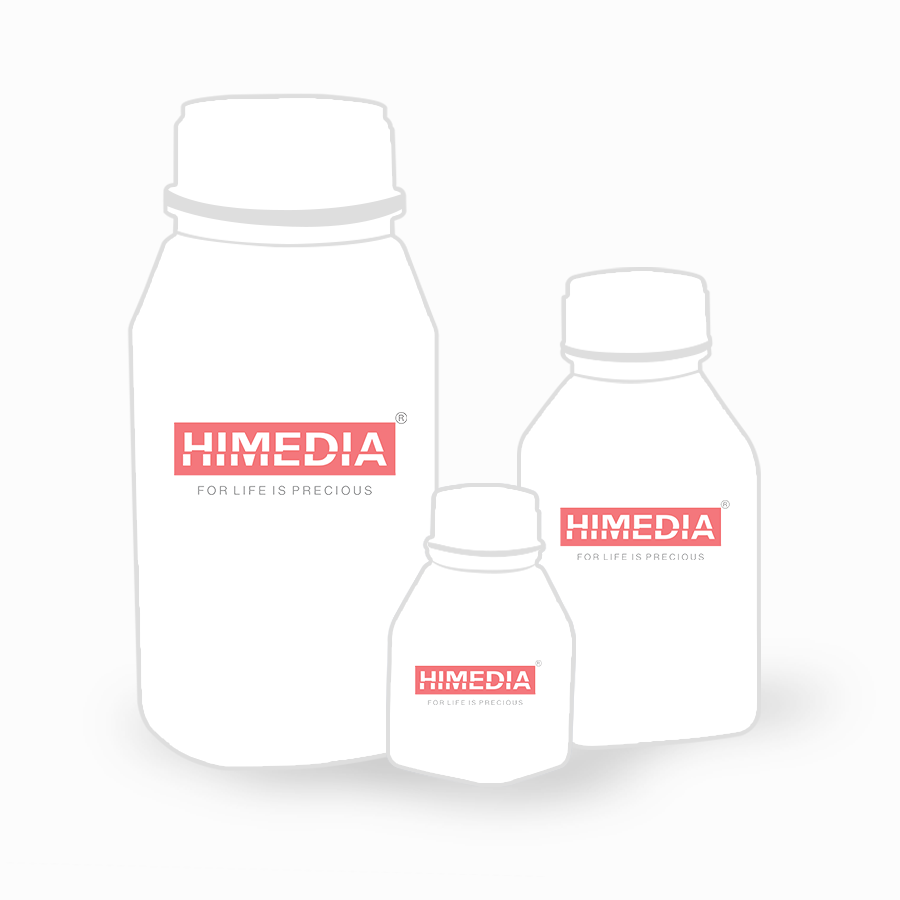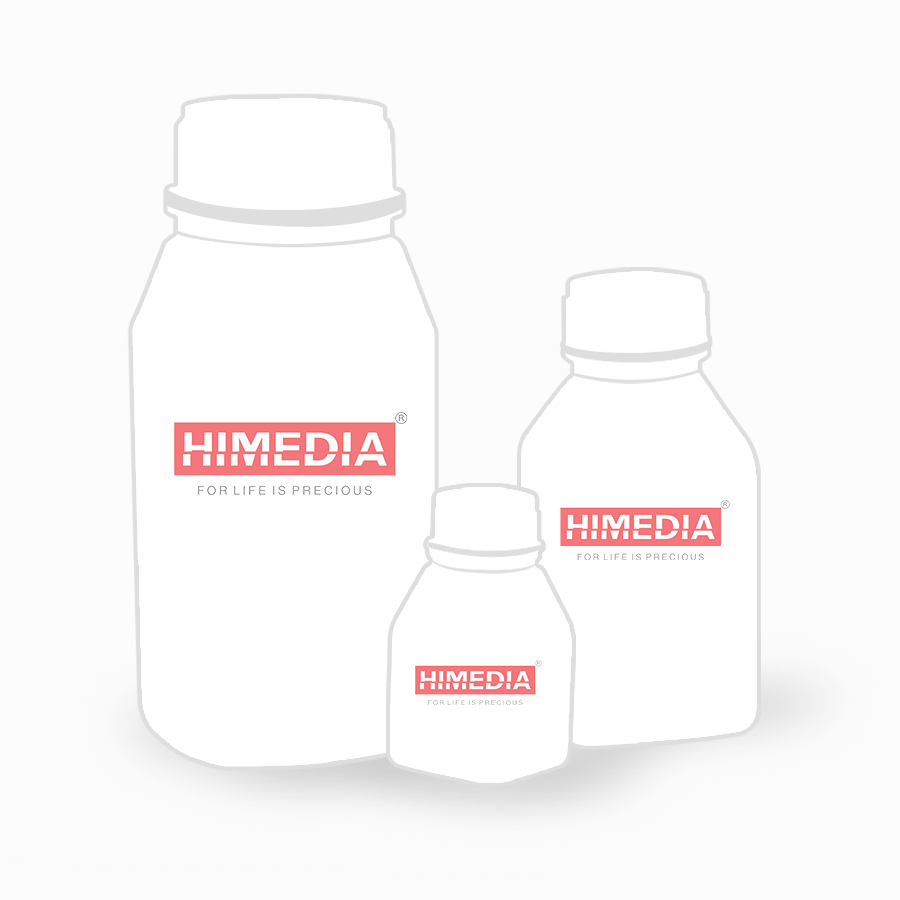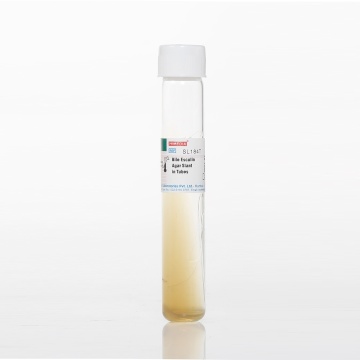 Your enquiry has been submitted
Your enquiry has been submitted
HiCrome® Strep B Selective Agar Base
Intended use
Recommended for selective isolation of Group B Streptococci from clinical samples.
Composition**
| Ingredients | g / L |
|---|---|
| Protein hydrolysate | 17.500 |
| Buffers | 2.500 |
| Chromogenic mixture | 2.540 |
| Selective agents | 0.110 |
| Agar | 15.000 |
Final pH ( at 25°C) 7.3±0.2
**Formula adjusted, standardized to suit performance parameters
Directions
Suspend 37.65 grams in 1000 ml purified/ distilled water. Heat to boiling to dissolve the medium completely. DO NOT AUTOCLAVE. Cool to 45-50°C and aseptically add the rehydrated contents of one vial of GCN Selective Supplement (FD273). Mix well and pour into sterile Petri plates.
Principle And Interpretation
Group B Streptococcus is a leading infection causing illness and death in newborns. Group B streptococci can also cause serious diseases in pregnant women, the elderly, and adults with other illnesses. GBS normally reside in the vagina of women and rectum of men and women (1). In newborns, group B strep is the most common cause of sepsis (infection of the bloodstream) and meningitis (infection of the lining and fluid surrounding the brain) and a common cause of pneumonia. In adults, group B strep can rarely lead to serious bloodstream infections, urinary tract infections, skin infections, and pneumonia, especially in people with weak immune systems. Heavy colonization of the maternal genital tract is associated with colonization of infants and risk of neonatal disease (2)
The sample collection is usually done by collection of vaginal and rectal swab between 35 and 37 weeks of pregnancy. The swab is then processed on HiCrome®Â® Strep B Selective Agar Base. For the conventional methods optimum recovery is however achieved by selective enrichment into Todd Hewitt broth with colistin and nalidixic acid and then subculture on Blood Agar (3,4).
Protein hydrolysate provides nitrogenous and carbonaceous compounds, long chain amino acids and other essential nutrients for the growth of Streptococci. Buffers present provides buffering to the medium. Selective agents in the medium inhibits accompanying flora. One of the substrate in the chromogenic mixture is cleaved by beta glucosidase possessed by Group B Streptococci resulting in blue coloured colonies.
Type of specimen
Clinical samples - Vaginal and rectal samples, urine, etc.
Specimen Collection and Handling
For clinical samples follow appropriate techniques for handling specimens as per established guidelines (5,6).
After use, contaminated materials must be sterilized by autoclaving before discarding.
Warning and Precautions
In Vitro diagnostic Use only. Read the label before opening the container. Wear protective gloves/protective clothing/eye protection/ face protection. Follow good microbiological lab practices while handling specimens and culture. Standard precautions as per established guidelines should be followed while handling clinical specimens. Safety guidelines may be referred in individual safety data sheets.
Limitations
- Individual organisms differ in their growth requirement and may show variable growth patterns on the medium.
- Each lot of the medium has been tested for the organisms specified on the COA. It is recommended to users to validate the medium for any specific microorganism other than mentioned in the COA based on the user's unique requirement.
- Further biochemical tests must be carried out for confirmation.
Performance and Evaluation
Performance of the medium is expected when used as per the direction on the label within the expiry period when stored at recommended temperature.
Quality Control
Appearance Cream to yellow homogeneous free flowing powder
Gelling Firm, comparable with 1.5% Agar gel
Colour and Clarity of prepared medium White to cream coloured opaque gel forms in Petri plates
Reaction Reaction of 3.77% w/v aqueous solution at 25°C. pH : 7.3±0.2
Cultural Response Cultural characteristics observed with added GCN Selective Supplement (FD273), after an incubation at 35-37°C for 24-48 hours.
| Organism | Inoculum (CFU) | Growth | Recovery | Colour of Colony |
|---|---|---|---|---|
| Escherichia coli ATCC 25922 (00013*) | >=10â´ | inhibited | 0% | - |
| Neisseria meningitidis ATCC 13090 | >=10â´ | inhibited | 0% | - |
| Staphylococcus aureus subsp. aureus ATCC 25923 (00034*) | >=10â´ | inhibited | 0% | - |
| Streptococcus agalactiae ATCC 13813 | 50-100 | luxuriant | >=50% | blue |
Key: *- Corresponding WDCM numbers
Storage and Shelf Life
Store between 15-25°C in a tightly closed container and the prepared medium at 2-8°C. Use before expiry date on the label. On opening, product should be properly stored dry, after tightly capping the bottle in order to prevent lump formation due to the hygroscopic nature of the product. Improper storage of the product may lead to lump formation. Store in dry ventilated area protected from extremes of temperature and sources of ignition Seal the container tightly after use. Product performance is best if used within stated expiry period.
Disposal
User must ensure safe disposal by autoclaving and/or incineration of used or unusable preparations of this product. Follow established laboratory procedures in disposing of infectious materials and material that comes into contact with clinical sample must be decontaminated and disposed of in accordance with current laboratory techniques (5,6).
Reference
- Anthony BF, Okada DM, Hobel CJ. Epidemiology of group B Streptococcus: longitudinal observations during pregnancy. J.Infect Dis 1978; 137:524-30.
- Murray P. R., Baron J. H., Pfaller M. A., Jorgensen J. H. and Yolken R. H., (Eds.), 2003, Manual of Clinical Microbiology, 8th Ed., American Society for Microbiology, Washington, D.C.
- NHS Processing swabs for Group B Streptococcal carriage Issue no.2.1,2006.
- Prevention of perinatal group B Streptococcal disease: a public health perspective . Centres for Disease control and Prevention. MMWR Recomm Rep 1996; 51:1-22.
- Isenberg, H.D. Clinical Microbiology Procedures Handbook 2nd Edition.
- Jorgensen, J.H., Pfaller, M.A., Carroll, K.C., Funke, G., Landry, M.L., Richter, S.S and Warnock., D.W. (2015) Manual of Clinical Microbiology, 11th Edition. Vol. 1.
| Product Name | HiCrome® Strep B Selective Agar Base |
|---|---|
| SKU | M1840 |
| Product Type | HiCrome™ |
| Physical Form | Powder |
| Origin | Animal |
| Packaging type | HDPE |
| References | 1.Bergogne- Berezin, E., m. L. Joly-Guillou, and J.F. Vieu. 198 |
| Customized Product Available | No |



